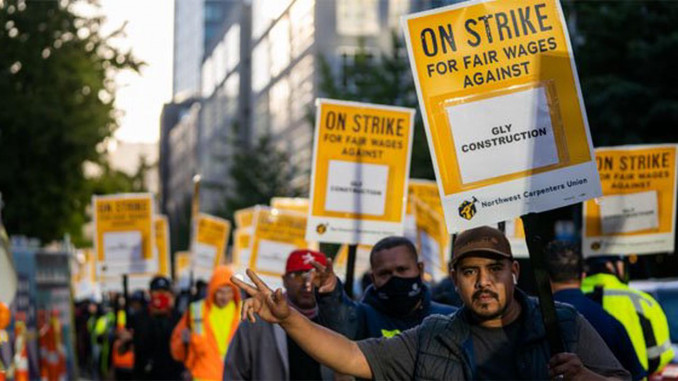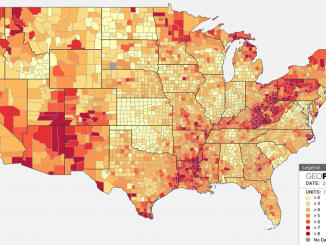
On Wednesday, October 6, after impressively voting down four previous tentative agreements, Seattle carpenters organized in the Northwest Carpenter Union began voting on a new agreement. The voting goes to October 11 with the result made public soon thereafter. They are back at work while the voting takes place.
The strike against the Associated General Contractors (AGC) began on September 16. Workers have shown serious resistance to the contracts endorsed by their union by voting down four tentative agreements. The issues they have held out for are better wage increases, more employer contributions to pensions and health care, full payment for parking (a big expense for contractors parking near their worksites) as well as health and safety and freedom from sexual harassment on the job. The carpenters also want a three-year rather than four-year contract -in order to have a contract that ends at the same time as others in the industry – ,.
Current pay is $46.92 hourly for carpenters; $47.17 for piledrivers; and $48.42 for millwrights, but even with these wages they are priced out of living in the city where they work. These workers have asked for a three-year contract with $5 an hour increase per year. Parking near worksites can amount to $50.00 per day and, with their heavy tools, workers can’t take public transportation. The last offer was rejected by the members 56% to 44%. This contract offered an increase of just over $9 per hour over four years instead of the $15 over three years that members want.
The discontent of many carpenters led a group to form the Peter J. McGuire Caucus to push for a better offer, and organize the workers’ power to seriously pressure the AGC. The caucus organized picketing, pushed for labor solidarity, and attempted to shut down as many sites as possible. On the other hand, the union has tried to put the brakes on this organizing, only allowing pickets on some sites for limited hours, and calling picketing at sites they haven’t authorized “wildcats.” In reality, once the union contract ended and the last offer was rejected, legally the workers had the right to picket any of the sites that didn’t have no-strike clauses. The union was pushing back against militant rank and file organizing, when there was no basis for it.
No-strike clauses have limited the legal power of the carpenters. Only 17% of them work on the sites that are not covered by no-strike clauses. The union agreed to these clauses when the owners of several sites signed Project Labor Agreements and other similar contracts. The union signed these no-strike pledges with employers who agreed to be bound by the settlements reached with other employers. This obviously benefits the employers’ association, the AGC, because it prevents the workers from shutting down the whole industry at once, leaving them weakened when they need solidarity most. The employers know this and when sections of their industry face a strike, they often help each other financially so that the struck business can hold out until that section of workers is weakened. For this reason, workers have good reason to go ahead and picket the sites with or without no-strike clauses, and to refuse to sign no-strike pledges.
The union has also added red-baiting to its attacks on the militant workers. After the Peter J. McGuire Caucus invited socialist city council member Kshama Sawant to a rally that drew a crowd of workers in solidarity, Nicole Grant, head of the King County Labor Council (KCLC) was quoted to have said “I never seen anything quite this serious in the course of my career, where a small faction of Marxist extremists, with the backing of an elected official, have been able to not just wreak this much havoc inside of a union but been this undermining.”
This kind of red-baiting promotes division among workers, and is founded on a lie: the majority of the union members voted the previous contracts down, not a small minority, and the Peter J. McGuire Caucus has workers with a range of political beliefs. In addition, 80 union members sent letters of appreciation to thank Sawant for supporting their struggle.
The previous offer would have given workers a more than 20% wage and benefits increase over four years, and a $1.50 per hour parking reimbursement, increased employer contributions to health care and pensions and provided stronger harassment and discrimination protections. As to the current contract, according to Ryan Case, a member of the bargaining team, it preserves a contract period of three years, rather than four, as the workers want. At the same time, it gives a roughly 15.4% increase in wages, a little under half of the wage increase hoped for. The agreement also expands parking benefits in the downtown Seattle and Bellevue cores.
As of this writing, it remains to be seen how the workers vote this time around, but it is an improvement over the last agreement, and most certainly thanks to the determination and independent organization of the more militant rank and file.




